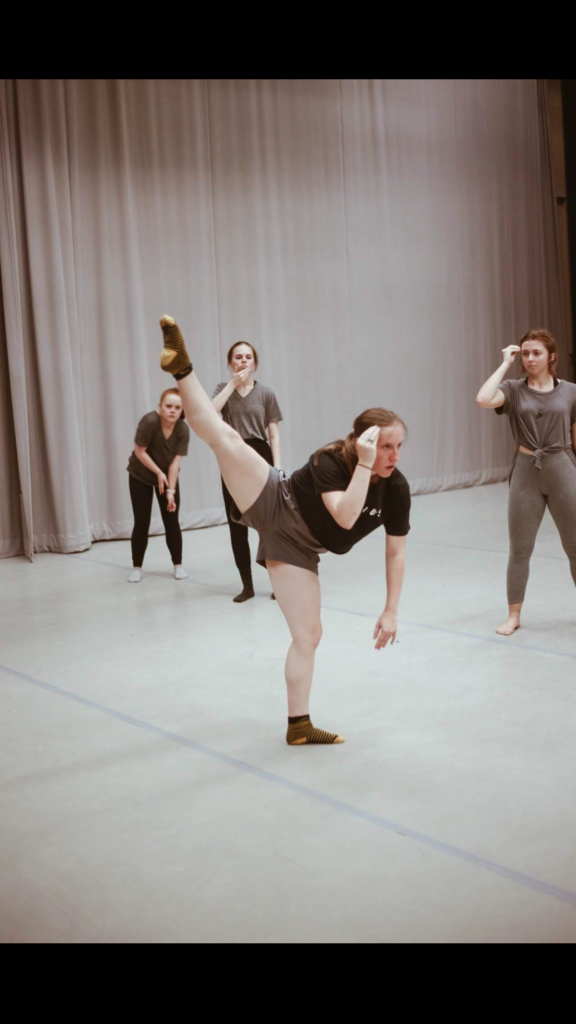My daughter is an artist. She just graduated from university with a Bachelor of Fine Arts degree in Dance Performance and Choreography – or, as she now says, “a completely useless degree.” I disagree – but that’s for another day. The arts will come back. They must. A world without art is a world without God. And that is not possible.
Her senior thesis, which encompassed most of this past year, was entitled “You Are What You Consume.” This thesis included a choreographed piece by the same name and an extensive written thesis on this theme. It was pretty impressive from a conceptual, and from an artistic, standpoint. But what I really appreciated was the process that went into it.
The premise of the thesis is that whatever we take in to our bodies or minds is going to shape who we become. The dancers who performed her senior piece spent hours discussing and writing about this topic in preparation for creating the phrases in the dance. (Side Note: The process of choreographing a dance is really incredible. There is a ton of thought, journaling, sketching, thinking, and for some dancers – praying, that goes into each piece. The effortless beauty you see on stage is forged in the furnace of work, and rework, and agony, and tears, and laughter. It is my favorite art form after years of learning about the process vicariously.) They discussed the things that consume them – people’s opinions, Netflix binges, the need for love and acceptance, ambition, brands and labels, emotions, people’s needs, etc. They also spent time exploring the things they consume – time, affirmations, other people’s emotions, food, coffee, alcohol, pride, gossip, themselves…
It’s deep. Dance, like most art, is supposed to be something you can interpret as you wish, allowing the movement to speak to you in whatever way is meaningful in your current state. But I prefer to know the artist’s heart and intent behind the art, whether visual or performing. I think you glean a lot more from the piece if you understand what the artist is trying to say than if you just let it say what you want it to say.
And I believe that is the case with the Master Artist as well.
2 Corinthians 3:18 says, “We all, who with unveiled faces contemplate the Lord’s glory, are being transformed into his image with ever-increasing glory, which comes from the Lord, who is the Spirit.” We become what we contemplate. But we have to contemplate rightly, with an understanding of what we are seeing. The verses before that tell us that when we turn to the Lord, he removes the veil from our eyes, and we are able to see Him as He really is.
Pete Greig, in his book “Teach Us to Pray” says, “If you mostly contemplate your phone your neural pathways will realign to reflect that reality. If you fill your mind with pornographic imagery, you will become more (not less) sexually frustrating and lustful. Numerous scientific surveys have shown that if you surround yourself with people who are kind and speak positively, you will become encouraging and optimistic… so when we meditate regularly on God’s goodness, and saturate our consciousness in his love, we become like him.”
When we contemplate Jesus, in all of the Truth of who He is, we rewire our brains, and our hearts, and we become more like Him. We transform from one level of glory to another, becoming ever-more like the One upon whom we gaze.
What does it mean though – to contemplate? According to Webster’s 1828 Dictionary, it means “to view or consider with continued attention; to study; to meditate on. This word expresses the attention of the mind, but sometimes in connection with that of the eyes; as, to contemplate the heavens.” Continued attention. Study. Meditate. Attention of the mind, but with the eyes.
It behooves us to think about the things to which we are giving our continued attention. Because while meditating on the glory of Christ will make us more like Him, it works with other things as well.
Our world right now is full of fear and chaos surrounding COVID-19 and all of its many ripple effects. When we spend our days contemplating COVID-19, reading news, listening to talking heads pontificate about the problems, engaging speculations about the future – we become fearful and chaotic as well.
Scrolling social media right now (and it’s only going to get worse folks – there’s an election coming!) is frustrating and angering and divisive. The more we contemplate those things, the more frustrated and angry and divided we become.
What we contemplate, we become. What we consume, we are.
Here’s a practice to help you sort through your inner world and the transformation taking place in you. Carve out 10-20 minutes and sit down with a piece of paper or a journal. Write down all the things that consume your attention during the day. Once you have your list, put estimates of the amount of time you give to each one. How much of that time of attention, contemplation, study, or meditation is on the glory of Christ? What do you need to do with that answer?

